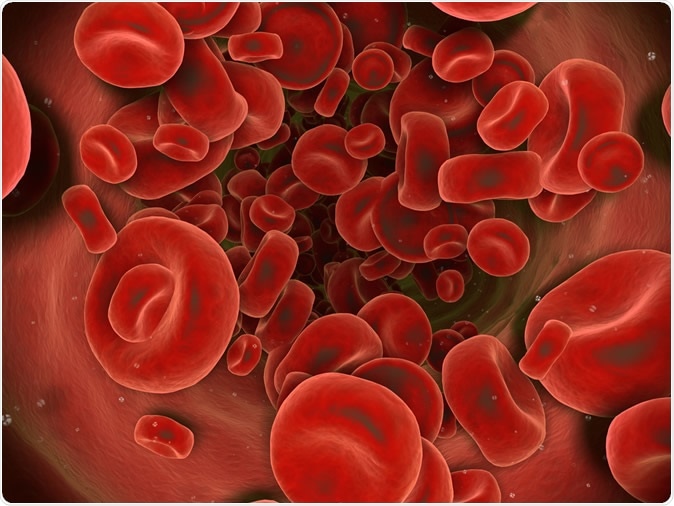The team of researchers at the University of Houston found that blood clotting proteins, both the ones that promote blood clotting (prothrombic) and those that disperse them (thrombolytic) are elevated in the urine of patients with lupus nephritis (LN).
Published in the journal Arthritis Research & Therapy, the study shows that among the proteins tested, urine plasmin has shown the greatest independent predictor of kidney function and renal disease status.
“Urine biomarkers represent promising candidates for the early diagnosis as well as the monitoring of disease activity and therapeutic responses in lupus nephritis,” Mohan, Hugh Roy, and Lillie Cranz Cullen, Endowed Professor of biomedical engineering, said. They further added that discovering the biomarker for ongoing lupus nephritis paves the way for a more comprehensive clinical monitoring of the illness.

Red blood cells. Image Credit: Remi Cauzid / Shutterstock
Systemic lupus erythematosus (SLE) treatment
Systemic lupus erythematosus (SLE) is an autoimmune disease that happens when the body mistakenly attacks healthy cells, tissues, and organs. As a result, inflammation happens and can cause serious damage to various parts of the body, which includes blood cells, brain, heart, lungs, skin, kidneys, and joints. One of the major complications of SLE is lupus nephritis, which is considered one of the most severe clinical manifestations of the condition. It’s also the leading cause of illness and death among people with SLE.
Currently, new drugs that act as immunosuppressive and biologics have dramatically improved the survival rates of people with systemic lupus erythematosus and lupus nephritis. But, the more important things to do is early diagnosis and monitoring disease flare-ups, to prevent the progression and worsening of the illness.
One of the procedures commonly used to determine if the kidneys are affected by SLE is a renal biopsy. It helps the doctor provide a diagnosis and prognosis of LN. However, the procedure can’t become a routine procedure because it’s invasive and expensive.
The researchers suggest using a non-invasive biomarker to help diagnose LN among patients – urine. Urine is easily collected and may reflect an underlying inflammation of the kidneys. The new test shows promise for early diagnosis and monitoring of disease progression and effectiveness of therapies in people with LN.
Urinary proteins related to coagulation
The researchers studied urinary proteins related to coagulation since the coagulation system disorders have been linked to SLE and LN patients. They also found that thrombotic events are higher in patients with SLE than healthy people.
They got samples of urine from 113 patients with LN who had been recruited from a renal clinic at UT Southwestern Medical Center from 2007 to 2011.
When they tested urines of patients with SLE, they found elevations in both pro-thrombotic and thrombolytic proteins in the urine.
“When I first saw the presence of both I thought 'This can't be right, so let's look at this in more detail with more urine samples and better assays,” Mohan said.
In summary, the study was the first one to assess the efficacy of blood clotting proteins as biomarkers for NL in patients with SLE. They assessed urinary pro-thrombotic molecules and anti-thrombotic molecules, which turned out to be elevated in patients with LN.
Systemic Lupus Erythematosus signs and symptoms
People with SLE may experience many symptoms, such as skin rashes, fever, pain or swelling in the joints, and fatigue. SLE flares also occur in some people, with periods of SLE symptoms happen years apart, and may go away, called remissions. But, in adults with SLE, they may have flares more frequently in their lifetime.
Some people may also experience other symptoms such as lung problems, arthritis, oral ulcers, sun sensitivity, psychosis, blood cell and immunological abnormalities, heart problems, and kidney problems.
The exact cause of SLE is unknown, but some studies have shown that a combination of genetics and environmental factors play an important role in the development of the illness. It affects women more than men and occurs between the ages of 15 and 44 years old.
Source:
Journal reference:
Urinary pro-thrombotic, anti-thrombotic, and fibrinolytic molecules as biomarkers of lupus nephritis, Ling Qin, Samantha Stanley, Huihua Ding, Ting Zhang, Van Thi Thanh Truong, Teja Celhar, Anna-Marie Fairhurst, Claudia Pedroza, Michelle Petri, Ramesh Saxena & Chandra Mohan
Arthritis Research & Therapyvolume 21, Article number: 176 (2019), https://arthritis-research.biomedcentral.com/articles/10.1186/s13075-019-1959-y